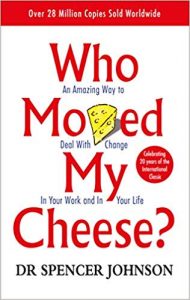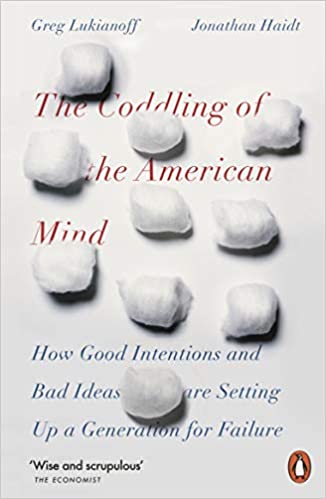I was rather amused recently to pick up the little fable ‘Who Moved my Cheese?’, which my daughter had picked up on her travels. Published in 1998 and written by Spencer Johnson, this was apparently a massive bestseller, interpreted for some reason as being about business – although it’s about business no more and no less than any other area of human life. It deals with basic questions about human motivation and responses to change. Its core message is, interestingly enough, about the Middle Way in some re spects, though it also seems to slightly miss the point in some others.
spects, though it also seems to slightly miss the point in some others.
What enables this fable to get straight to the point is the way it strips down the complexity of human experience, by setting the story in an apparent endless (almost Borgesian) maze and reducing the focus of all human desires and values to ‘cheese’. We don’t know where ‘cheese’ comes from, or what rules, if any, determine its appearance in the maze (we don’t need to know). All we know is that it appears in the maze from time to time and is the only goal for the characters in the fable. I imagine that Johnson must have started his fable as being about mice in a maze in a psychological experiment, but then decided that mice did not reflect the complexity of human nature closely enough. So instead we have four characters – two mice and two ‘Littlepeople’ (humans that are the same size as mice, and in the same situation).
The mice, Sniff and Scurry, are mainly just a contrast with the Littlepeople, Hem and Haw, said to behave in more straightforward ways due to their smaller brains. This was one area that I found unconvincing, because it seems likely that mice could also get into the same kinds of problems that the Littlepeople do. The problem that frames the story is that all four characters have been accustomed to finding cheese in one place, ‘Cheese Station C’, but then it dwindles and disappears. The mice quickly adapt and scurry off to sniff out cheese elsewhere, but the humans are cognitively attached to only getting cheese in that one place, so they continually rationalise their belief that the cheese will start coming there again. Of the two LIttlepeople, Hem is so stuck that he never leaves Cheese Station C, and gets thinner and thinner, but eventually, with many struggles, Haw overcomes his fear of change and goes off to look for cheese elsewhere. Eventually, of course, he finds it.
So what does this have to do with the Middle Way? Well, the Middle Way is the avoidance of absolutisation, which means getting stuck in particular beliefs that one takes to be the whole story. This is exactly what Hem does, as he absolutises his belief that cheese will return to Cheese Station C and keeps going back there day after day. Haw, on the other hand, illustrates the positive process of the practice of the Middle Way, as he gradually starts to think more provisionally and consider other possibilities. The contrast between them illustrates the adaptivity of the Middle Way – namely, the way in which avoiding absolutisation allows us to face up to changed conditions. To take an overwhelming parallel from the present, Hem could be seen as a climate change denier, stuck in old patterns of thinking, whilst Haw is someone who gradually faces up to the high probability that the ‘cheese’ of a habitable range of planetary temperatures is dwindling and may be about to disappear entirely.
However, there are also aspects of the Middle Way that I think the fable misses. The chief one of these is the tendency for absolutisation to come in opposed pairs of opposites, the attractiveness of which is so strong that the rejection of one absolute is almost bound to result at least temporarily in the adoption of the opposite extreme. This would result in Haw not just reluctantly starting to look for new cheese, but suddenly being struck, as by a revelation, of the falsehood of his previous belief of the Second Coming of cheese to Cheese Station C. He then might become slightly manic in his search for cheese elsewhere, or indeed might fixate on one other alternative cheese station where he believes it’s bound to be. Giving up on absolutes is not just a binary switch from one view to another, but involves a process of navigation between extremes, with constant adjustment and re-adjustment. There is no sign in the fable that Johnson gets this aspect of psychology, constantly illustrated as it is by human behaviour.
Johnson’s attribution of the ‘stuck’ state to one of the Littlepeople rather than to the mice also seems questionable to me, because it assumes that mice don’t get stuck – i.e. that it’s a uniquely human trait arising from our large brains. However, all other mammals and birds have the same bilateral brain structure that we do, which presumably means that the goal-oriented left hemisphere in other animals can become over-dominant just as it can for us. You don’t necessarily have to have a representation in language, as humans do, to be implicitly convinced that your image of the world is absolutely correct. The monkey trap, in which monkeys who put their hand in a jar to get food are trapped by the narrow aperture of the jar as long as they won’t let go of the food, would be an example of another species getting ‘stuck’ in the same way. So I’m not sure that Spencer could not have written a more straightforward fable that was just about mice, rather than inventing ‘Littlepeople’ who are in the position of mice.
In the Wikipedia article on ‘Who Moved my Cheese?’ (which you could read for an alternative summary of the story), one of the criticisms that have been made of it is mentioned. Managers have apparently given the book out to their employees to encourage them to respond ‘flexibly’ to re-structuring or redundancy – a procedure that obviously involves interpreting the story far too narrowly. The employees could just as reasonably give the book to their managers to encourage them to respond ‘flexibly’ to a demand for better pay and conditions! The conditions we need to adapt to are not those created by those who have assumed authority, because those people could also do some adapting in solidarity with others, rather than adopting the demand for provisionality as a tool of power. The people who give and take away the cheese are not the managers but rather the conditions that really are beyond our control, and perhaps even our explanation. The use or abuse of the story in business seems to have contributed to a lack of understanding of its universality.
So, I wouldn’t make excessive claims for this little book. You’re unlikely to get very much more from reading it than you will from my summary or that on Wikipedia. It offers some insights, but also lacks a few more. Nevertheless, it is interesting that it has apparently struck such a chord with its readers and been so accessible. It may be worth picking up if, as it did for me, it crosses your path.


